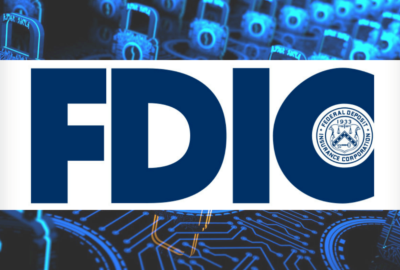

GAO auditors have a couple more recommendations for the FDIC, which is meant to ensures the financial soundness of the banking system.
Best listening experience is on Chrome, Firefox or Safari. Subscribe to Federal Drive’s daily audio interviews on Apple Podcasts or PodcastOne.
The Federal Deposit Insurance Corp., which ensures the financial soundness of the banking system, has a few weak financial controls of its own. That’s what the Government Accountability Office found in reviews of FDIC contracting in two investigations. Now auditors have a couple more recommendations for the agency. For the details, the GAO’s Director of Financial Management and Assurance issues, Jim Dalkin, spoke to Federal Drive with Tom Temin.
Interview transcript:
Tom Temin: Jim, good to have you back.
Jim Dalkin: Thank you Tom, good to be here.
Tom Temin: Now, in the 2019, I guess, in 2020, looks at FDIC, what did you find? What are they contracting for with respect to their oversight of these big, large banking funds that they’re charged with maintaining?
Jim Dalkin: Well, every year the GAO does a financial audit of the FDIC. And part of that financial audit is to look at their disbursements, the money going out. And typically we make a statistical sample, if you will. And in this last year, we found that there were about five instances where there were issues in terms of the payments and the controls around those payments that the FDIC would make, mostly for administrative services.
Tom Temin: Yes, this concerns the deposit insurance and he Federal Savings and Loan Insurance Corporation Resolution Fund, the two big funds they oversee. So these are the acquisition of services to help them run the funds?
Jim Dalkin: Yes, this would be telephonic support and other typical contract, the type of cost.
Tom Temin: And what is the particular controls they’re lacking, or what aren’t they doing with respect to those procurements?
Jim Dalkin: Well, what we found was that while they had policies and procedures in place, what we didn’t see was a level of rigor in terms of the actual review. So if you have an invoice, you may want to match it with another piece of information to make sure it’s proper or match it to a pricing schedule. And they did have the requirements that their administrative people do that. But it looks like they just didn’t do it with enough rigor, because we found mistakes.
Tom Temin: And what are the value annually of these contracts? Are these in the billions, hundreds of millions, 57 cents?
Jim Dalkin: Some of the contracts we looked at were around $300,000. Now, in this case, again, we’re doing a sample. So what we’ll do is we’ll look to see if they properly have put those controls in place, and it’s a sample size. So if there’s an issue, then we would project it. So we did not find significant dollar deviations as much as deviations from what their policies and procedures were.
Tom Temin: So it’s a potential for improper payments or mistaken money, but there’s not that much evidence that actually money went out the door wrongly.
Jim Dalkin: Exactly. And the five instances we identified in our stat sample, only two of them related to dollars. The others were just that they were not doing the policies and procedures to safeguard. And so we flagged those as well. But because there were five of them, it was enough for us to put something in our report.
Tom Temin: Yeah, it looked almost like they had a systemic problem, perhaps.
Jim Dalkin: Yes, that’s what we look for. And in the type of report that we did, it’s it’s really killing those in charge, management, that they really need to look at this. And they have.
Tom Temin: We’re speaking with Jim Dalkin, he’s director of financial management and assurance issues at the Government Accountability Office. And before the latest two recommendations, what had you recommended to FDIC from the earlier audits and what was the reaction to those? Have they taken those out?
Jim Dalkin: Well, in previous years, we really didn’t have the same type of issues. There were a few it related items that we alerted management to, but they really haven’t had this level of an issue previously.
Tom Temin: Alright, so what are the new recommendations? What do you tell them to do here?
Jim Dalkin: Well, in essence, what management needs to do is really increase the rigor of the reviews, and/or increase the monitoring to make sure those reviews are done, and they’re done accurately.
Tom Temin: Is this a function simply for the contracting shop or should the CFO be involved? I mean, who does this apply to I guess I’m asking?
Jim Dalkin: it’s really a combination of everyone. So the CFO shop has responsibility, but you really need in large agencies such as FDIC, you really need to have coordination of all parties involved.
Tom Temin: Yeah, FDIC, I guess, is one of those agencies that’s fairly big and oversees a big pot of money, a couple of big pots of money, to rescue banks if need be. But yet, they don’t really do a lot of large scale procurement like say the Defense Department does or VA, do they?
Jim Dalkin: No, they’re not buying some of those big assets you might associate with the Department of Defense, but they do have a lot of procurement related to just their operations. And that’s an important element. And that’s really what we were looking at here.
Tom Temin: And what was the reaction?
Jim Dalkin: Well, they looked at it, they agreed with our comments and they have put a plan in place going forward to remediate those issues.
Tom Temin: And if there is a need for greater oversight, greater examining and comparing of documents, for example, before money is paid or invoices are approved, can that be something that’s systemized? I mean, you’re not asking them to make eight part forms and pass them around the agency.
Jim Dalkin: No, it’s really monitoring that review process. And what we will do is during our audit next year, we will go in and see if there has been progress, in a way we will be checking on it.
Tom Temin: Is this something you see from time to time across the government? The little inattention around the edges that if left unfixed could get closer to the danger of improper payments.
Jim Dalkin: It is something that we see in government. You have a lot of dollars going out, you have a lot of contracts, and a lot of the governmental people that are paying those contracts have a lot of time pressure and a lot of invoices to get through. So I think it’s good to remind them, hey, you need to have sufficient monitoring, you need to have sufficient reviews, so something doesn’t go out that should not.
Tom Temin: Jim Dalkin is director of financial management and assurance issues at the GAO. As always, thanks so much for joining me.
Jim Dalkin: Thank you Tom.
Copyright © 2025 Federal News Network. All rights reserved. This website is not intended for users located within the European Economic Area.
Tom Temin is host of the Federal Drive and has been providing insight on federal technology and management issues for more than 30 years.
Follow @tteminWFED


